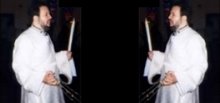On December 4, we remember one of the great Fathers
not only of the Antiochian Church, but of the Orthodox Church as a whole: St.
John of Damascus.
St. John lived in Damascus in the late 7th-early 8th
centuries, when the region was under Moslem rule. His family was held in high
regard, and John succeeded his father as chief counselor to the ruling Caliph.
A brilliant and well-educated Christian, he wrote in defense of the Holy Icons
at a time when the Byzantine empire was in the hands of the iconoclasts – the
“icon smashers” who, under Moslem influence, believed that images or depictions
of God in any form fell under the Old Testament condemnation of “graven images.”
The emperor, the notorious iconoclast Leo the
Isaurian, seeking to silence him, slandered John to the Caliph, forging a
letter claiming to be from him in which he offered to betray the Caliph in
order to enable the retaking of Damascus by the Byzantines. The Caliph believed
the lie, and in retribution, removed John from his post and ordered that his
right (writing) hand be cut off. In pain and in despair, John prayed to the
Theotokos, and fell asleep in front of her icon – and awoke to find his hand
miraculously re-attached, with only a thin red scar to show where it had been
severed.
In thanksgiving, John had a small silver hand added to the base of the
icon, which was henceforth known as Panaghia Tricherousa, or the
Theotokos “of the Three Hands.” This wonderworking icon now resides on Mt.
Athos, in the Serbian Monastery of Hilandar.
Seeing the miracle, the Caliph understood that John
had been falsely accused and he forgave him, seeking to restore him to his
former position. But John left the palace and his life in the world and entered
the monastery of St. Sava the Sanctified in Jerusalem, where he was to spend
the rest of his days. His elder was a harsh man, and would not permit him to
write. One of the monks at the monastery, however, lost his brother, and begged
John to write something, anything, to
console him in his grief. John refused at first, but eventually took pity on
him and wrote for him the funeral hymns (see p.4) we sing to this very day: “What earthly
sweetness remaineth unmixed with grief?” all the way through “I weep and I wail…”
His elder was furious, and as a penance, ordered John to wash out all of the
toilets in the entire (huge) monastery with his bare hands. John was chastened
and hurried to obey. But not long after, the Theotokos appeared to the elder in
a dream and commanded him to bless John, once again, to write. And so he
continued his brilliant career as a theologian and hymnographer and one of the
greatest of all the church Fathers.
By his prayers, Lord Jesus Christ have mercy on us and
save us!




No comments:
Post a Comment